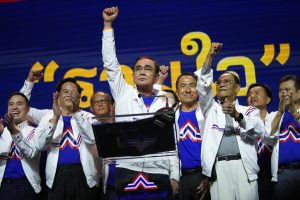Thailand’s long-serving leader Prayut Chan-o-cha yesterday officially broke with the country’s military-backed ruling party and joined the newly formed United Thai Nation Party (UTNP), expressing his willingness to remain prime minister after this year’s election.
The 68-year-old retired general, who has been in power since leading a coup in 2014, made the announcement at the official launch of the UTNP at the Queen Sirikit National Convention Center in Bangkok, where he was unveiled as a party member and parliamentary candidate.
“Many things have to continue, and more needs to be done for the country to forge ahead,” Prayut told a crowd of about 10,000 dressed in the party’s blue, red, and white insignia, according to a Reuters report.
“I’m standing here because I respect democracy,” he added. “Not that I want to cling on but the country must move on towards progress and prosperity. If I have the chance [again]I will.”
While Prayut has yet to dissolve parliament, an election must be held by May, and Thai politics is in a ferment as politicians maneuver for position ahead of the polls.
To the extent that Thai political parties have an ideological basis, there is little to separate the UTNP, which was founded last year by Prayut’s adviser Pirapan Salirathawipak, from the ruling military-backed Palang Pracharath Party (PPRP). Like the PPRP, it is led by figures from the country’s conservative establishment and stands for a form of tightly ordered and managed democracy, guarded by the Royal Thai Army and sacralized by the institution of the monarchy. As such, it is very likely to end up in alignment with the PPRP after the coming election, either in government or opposition.
The more interesting thing about Prayut’s party-hopping is what is suggests about intra-party divisions within the PPRP. While not a member of the party, Prayut was elected prime minister under its banner at the last general election in 2019, after nearly five years of serving as the country’s unelected military leader.
But there have been thinly veiled tensions between Prayut and the PPRP’s leader, Deputy Prime Minister Prawit Wongsuwon. The political falling out between the pair was laid bare PPRP announced that Prawit would be its candidate for prime minister at the upcoming election, and Prawit said that he wouldn’t try to stop Prayut from leaving the PPRP.
The switch of party affiliations also speaks to Prayut’s own ambitions and possible delusions of grandeur. While the constitution states that he can only serve for two more years, he said last month that he was ready to serve longer, Reuters reported.
In November, a source from within the UTNP said that the change of party would allow Prayut to shed the military image that has clung to him since he led the 2014 coup. “His military image will take a back seat to his prominent role as a politician,” the source said.
But Prayut may be overestimating the extent of his own popularity.
If the large numbers of empty seats at the UTNP’s launch event yesterday are any indication, the party faces an uphill battle to prevail at the coming election. In the meantime, Prayut trails in opinion polls of preferred next prime minister, behind the 36-year-old Paetongtarn Shinawatra, the daughter of former prime minister Thaksin Shinawatra and niece of former prime minister Yingluck Shinawatra, both of whom were removed from power by military coups, the latter by Prayut himself in 2014. Parties associated with the Shinawatras have won every free and fair election since 2001, barring the highly circumscribed 2019 election. (Even then, the Thaksin-aligned Pheu Thai Party won the most seats in parliament.)
But the problem for Prayut goes beyond a shortfall of popularity or democratic legitimacy to the fact of his role as a cog in a more complex machine. Aside from the king, Thailand’s “network monarchy” privileges the system over the individual – and the fact that Prayut has spent eight years in power says nothing about the willingness of the system and its powerbrokers to back him for another term in office. Come May, one of Thailand’s longest serving prime ministers may well find himself in the purgatory of small party politics.

































